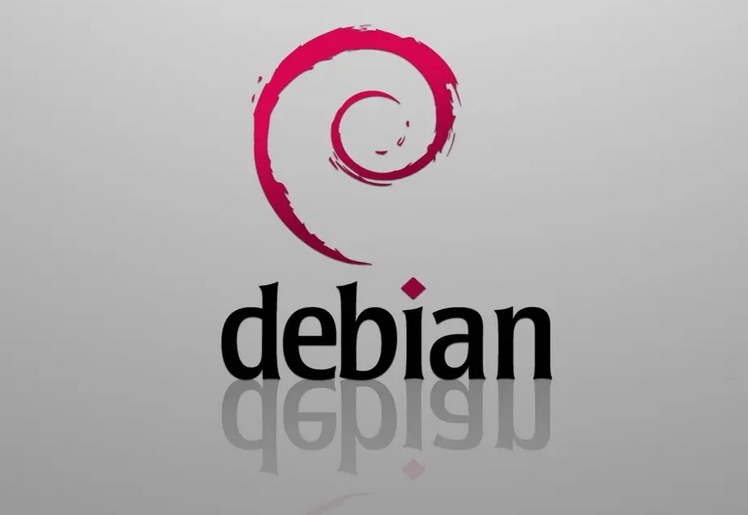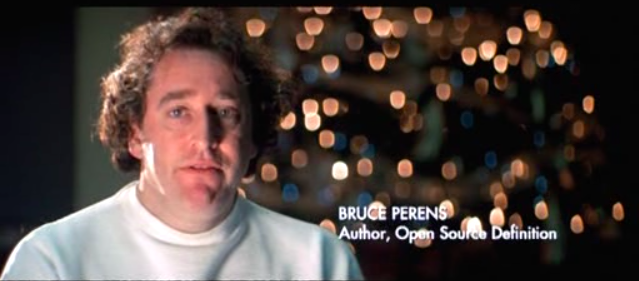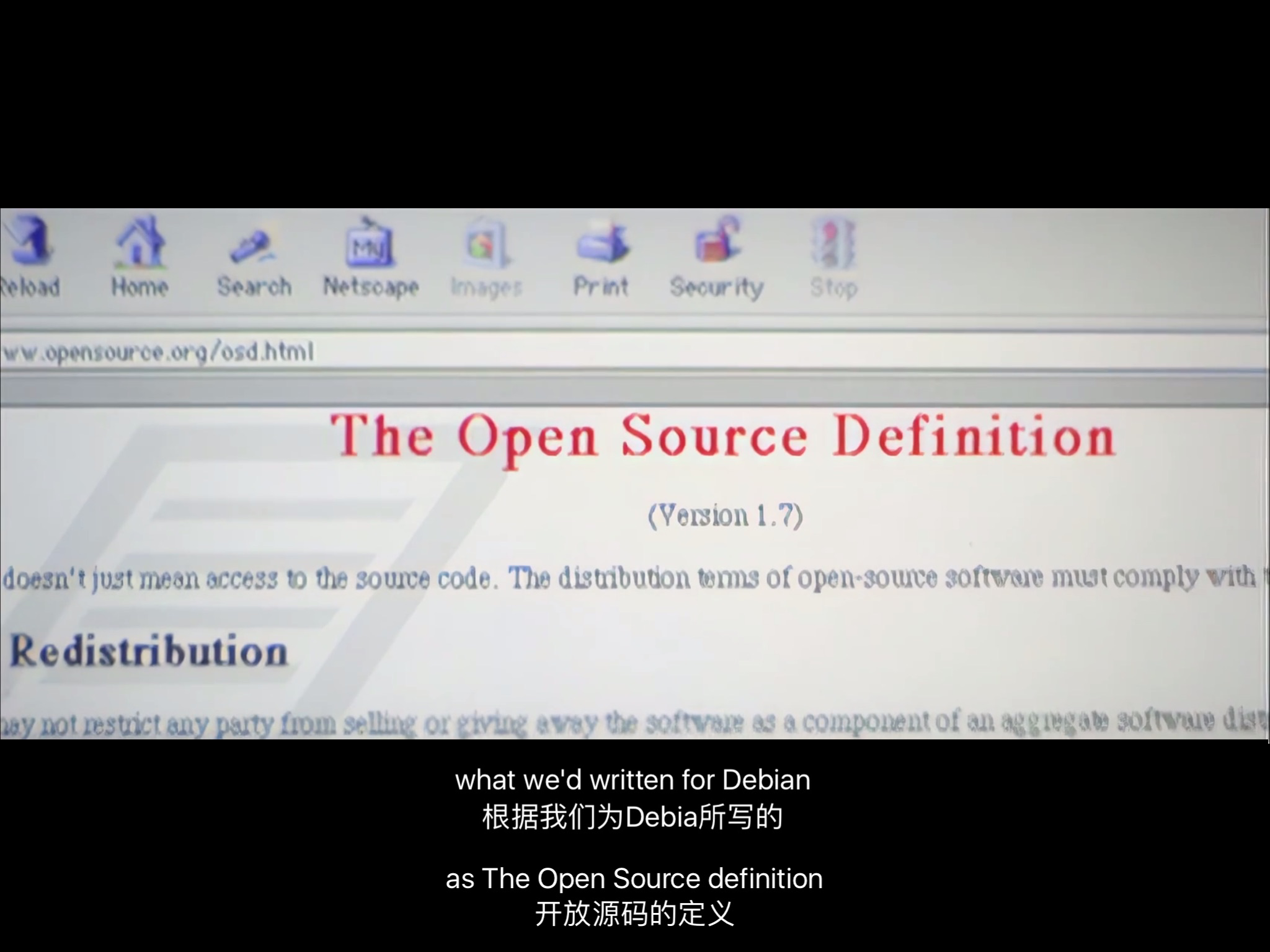1993年,8月16日早上5点31分03秒,与新闻大亨 Ian Murdock 同名的普渡大学学生在 Linux 新闻组里发了一条信息,阐述了他对 Linux 的想法,最古老 Linux 发行版之一 Debian 就此诞生。
Murdock 那时候应该没有想到,Debian 会在开源历史获得如此重要的地位。
1996年,Murdock 退出 Debian 项目的领导,接手的正是 OSI(Open Source Intiative)的发起人 Bruce Perens。在他的主导下,现在官方标准的开源定义 OSD(Open Source Definition)就是从 Debian 自由软件指导方针演化而来。
身为开源界的“长老”,Debian 无论是从经济上还是意识形态上,都表现得很硬气!
Debian 的独立性不仅体现在与商业公司保持距离,它还同时在“GNU”和“Linux”两股开源不同分支之间的分歧上,采取清醒的态度。立场硬气的 Debian 口号是:“Linux for Human beings”。

01 谁也不能一手掌握 Debian
Rather than being developed by one isolated individual or group, as other distributions of Linux have been developed in the past, Debian is being developed openly in the spirit of Linux and GNU.
与其他 Linux 发行版本不一样,Debian不应该是由某一孤立的个体或团体发展,而应该在 Linux 和 GNU 的精神下发展下去。
成立之初,Murdock 发布了 Debian Linux 宣言为 Debian 注入了开源灵魂,他呼吁 Debian 是为了发扬 GNU 和 Linux 的自由精神而创建。然而,又不像 Linus 之于 Linux、Guido 之于 Python...... Ian Murdock 并没有牢牢地占据着 Debian 的中心,而是在两年后就卸任离开了。
他的继任者—— Bruce Perens 能量更不可小觑。
Bruce 出生时患有脑性瘫痪,小时候言语不清,还被误诊为发育障碍,学校甚至都没有教他阅读。但所有这一切都不妨碍他成为 OSI 联合创始人、开源运动发起者、“开源定义”创建者。

纪录片《操作系统革命》中的 Bruce Perens 还年轻
当时的 Bruce Perens 正忙于一个叫做“Linux for Hams”的 Linux 发行版 CD,正要收录 Debian 时,却发现 Debian 需要的帮助更多。1996年4月,Bruce 被 Ian Murdock 任命为 Debian 的第二位领导者。
“Bruce 接任我是一个自然而然的选择,他已经为基础系统工作了近一年时间,为 Debian 所花费的时间比我还要多。” 当时 Debian 还没有所谓的选举制度,Ian Murdock 这样解释他的选择。
事实证明,Murdock 的选择没错。
当时的开源社区普遍都处于起步阶段,比如当时在红帽工作的 Ean Schuessler 就曾抱怨红帽对于社区连个起码的约定都没有。Bruce Perens 在1997年6月初向 debian-private 邮件列表中的Debian 开发者提出了 Debian 社会契约草案。
“Debian 开发出来之后,Debian 除了遵循 copyleft 之外,也遵循着一些其他的自由许可证。所以当时的 Debian 在自由软件方面还存在一些问题,因为它没有向 Debian 之外去明确其自由软件的理念。 ” Bruce Perens 在后来的文章回忆说。
这个草案在 Debian 开发者内部经历了一个月的激烈讨论,最终协调修订成为 Debian 社会契约和 Debian 自由软件指导方针——也是著名的 OSD 的雏形。
In 1993, at 5:31:03 in the morning on August 16, a Purdue University student with the same name as news tycoon Ian Murdock posted a message in the Linux newsgroup explaining his thoughts on Linux, one of the oldest Linux distributions A Debian was born.
Murdock didn't expect at that time that Debian would gain such an important position in the history of open source.
In 1996, Murdock retired from the leadership of the Debian project and took over Bruce Perens, the initiator of OSI (Open Source Intiative). Under his leadership, the official standard OSD (Open Source Definition) evolved from the Debian free software guidelines.
As the "elder" of the open source industry, Debian has acted very hard, both economically and ideologically!
Debian's independence is not only reflected in keeping its distance from commercial companies, it also takes a sober attitude on the differences between the two open source branches of "GNU" and "Linux". The hard-headed Debian slogan is: "Linux for Human beings".
01 No one can master Debian with one hand
Rather than being developed by one isolated individual or group, as other distributions of Linux have been developed in the past, Debian is being developed openly in the spirit of Linux and GNU.
Unlike other Linux distributions, Debian should not be developed by an isolated individual or group, but should be developed in the spirit of Linux and GNU.
At the beginning of its establishment, Murdock released the Debian Linux Manifesto to inject an open source soul into Debian. He called on Debian to be created to carry forward the spirit of freedom of GNU and Linux. However, unlike Linus to Linux and Guido to Python... Ian Murdock did not firmly occupy the center of Debian, but left after two years.
The energy of his successor, Bruce Perens, cannot be underestimated.
Bruce was born with cerebral palsy, slurred speech as a child, and was misdiagnosed as a developmental disorder. The school did not even teach him to read. But all of this does not prevent him from becoming the co-founder of OSI, the initiator of the open source movement, and the creator of the "open source definition".
Bruce Perens in the documentary "Operating System Revolution" is still young
Bruce Perens was busy with a Linux distribution CD called "Linux for Hams". When Debian was about to be included, he realized that Debian needed more help. In April 1996, Bruce was appointed by Ian Murdock as the second leader of Debian.
"It was a natural choice for Bruce to take over. He has been working on the basic system for nearly a year, and he has spent more time on Debian than me." At the time, Debian did not have a so-called electoral system, Ian Murdock explained his choose.
It turns out that Murdock's choice was right.
At that time, the open source community was generally in its infancy. For example, Ean Schuessler, who worked at Red Hat at the time, complained that Red Hat did not even have a minimum agreement on the community. Bruce Perens proposed a draft of the Debian Social Contract to Debian developers on the debian-private mailing list in early June 1997.
"After Debian was developed, in addition to copyleft, Debian also followed some other free licenses. So Debian at that time still had some problems with free software, because it did not clarify its free software concept outside of Debian. "Bruce Perens recalled in a later article.
This draft went through a month of intense discussions among Debian developers, and finally coordinated revisions to become the Debian Social Contract and Debian Free Software Guidelines-the prototype of the famous OSD.
In addition, Bruce Perens's influence on Debian does not stop there. Bruce is an out-and-out generalist. His field is not limited to computer engineering and law. He has also worked for the animation production company Pixar for 12 years. He has participated in the two classics of "Bugs" and "Toy Story 2". do. It is not difficult to explain why the Debian version number uses the character name in "Toy Story".
However, Bruce Perens still failed to become the center of Debian, and he also received a lot of criticism during his tenure-some developers believe that he is dictatorial, in charge of almost everything, but also in control of everything.
In December 1997, Bruce Perens, who had been in charge of Debian for a year, stepped down. In less than three months, he and Eric Raymond established OSI, began to manage open source activities and certification marks, and became a leader in the open source movement. (Interestingly, Debian founder Ian Murdock is also on OSI’s original list of directors.)
And Debian also began to write the Debian Constitution to avoid the concentration of power on the leader. For example, the Debian leader can make a decision in a specific area, but it must be handed over to another technical leader; the democratic process can remove the project leader and overturn any decision of the leader, and so on.
Since then, the past leaders of Debian have almost followed the rhythm of changing every year. In the eyes of some Debian developers, what the person in charge of Debian has to do is to hold meetings and so on, and introduce Debian to the world outside the community.
Of course, such a large reduction in leadership authority will also pave the way for some future problems of Debian.
02 There is no "golden father" in the Debian world
Debian's personality is not only limited to the interior, but also manifested in their hard-heartedness when facing the "gold master".
Before Ian Murdock established Debian, there were few Linux systems to choose from, and Debian was a typical pioneer. Therefore, Debian soon attracted the attention of FSF (Free Software Foundation). In November 1994, Debian received a financial support from the FSF.
You must know that FSF is not a good talker. They strictly follow the GNU philosophy and are famous for their dedication to free software. Unsurprisingly, FSF complained about the existence of non-free software libraries in the Debian system. From the FSF's point of view, Debian should stand in the camp of free software and maintain pure free software attributes.
Will Debian be restrained? It's totally impossible.
In 1996, Bruce Perens, the head of Debian at the time, sent an email: "After a period of poor communication, Debian and FSF resumed their sincere relationship and began to collaborate. However, FSF no longer has been due to its previous complaints to Debian. Has the control over the Debian project, and Debian will no longer ask for the resumption of sponsorship."
In short, the Debian team is determined to reduce FSF's ongoing sponsorship-we don't need the money. So far, FSF's funding for Debian has only been maintained for one year.
At this point, FSF has included it in the list of operating systems that are not recognized by it, and Debian has therefore become the only Linux distribution that does not have any traces of non-free in the main library but is not recognized by the FSF:
Debian’s social contract states that its goal is to make Debian completely free software, and Debian consciously excludes non-free software from its official release. However, Debian still maintains a repository of non-free software. According to its project, these software are "not part of the Debian system", but the software library is hosted by many of the main servers of the project, and people can immediately find these non-free software by browsing Debian's online software package database and its wiki.
It also has a "contrib" software library; its software packages are free, but some of them need to load separately released proprietary software. This is not completely separate from the main Debian distribution.
In order to solve the money problem, Bruce Perens immediately initiated "Public Domain Software" (Software in the Public Interest, Inc, generally abbreviated as SPI) in 1997. The original intention of SPI was very simple. It was for Debian not to be controlled by the Free Software Foundation. Later, they believed that SPI should also use its spare energy to help more projects. Therefore, SPI will support PostgreSQL, FFmpeg, Arch Linux in the days to come. , Jenkins and other outstanding projects.
Therefore, not only did Debian not have any commercial giants, but they also excluded foundations with a little ideology from the list of gold owners, gaining the greatest degree of economic independence. In Debian, there is no seat at all. If you want to be technically dominant, and make contributions in an open and transparent manner in accordance with social agreements and regulations, developers can develop according to their own understanding.
These features make Debian unique among many GNU/Linux distributions.
What's more interesting is that the quarrel between Debian and FSF has not stopped. Until 2003, Bruce Perens had been retiring for several years, and they were still fighting between the two: Now, can we please see some work on this, rather than bickering ? (Do you feel the helplessness between the lines in Bruce's words?)
03 Linus is not welcome
If you think that Debian and FSF are like water and fire, then you are wrong. In fact, Debian's "hardness" is not blind rejection, but insistence "in principle", as can be seen from Debian's attitude towards Linus Torvalds, the father of FSF and Linux.
In September 2020, 253 internal discussion emails of the Debian project published in 2014 were leaked on the Internet and attracted a lot of attention. According to the contents of these emails, Linus Torvalds' words and deeds at the DebConf meeting at that time caused some controversy. To
Some people believe that Linus’s description of FSF in his speech as “dishonest (dishonest), immoral (immoral), lying (liar), bigoted (paranoid)” is a serious violation of the community code of conduct. , So he should be permanently banned from attending future meetings.
The content of the email also mentioned that Debian should publicly declare that Linus will not be welcome to participate in Debian activities in the future.
In fact, it is not the first time that Linus has caused controversy because of his improper words and deeds. In 2018, Linus took a temporary vacation from the Linux community and publicly apologized for his remarks because of his performance at the Linux Maintainers Conference.
Image source: https://zhuanlan.zhihu.com/p/46904088
Although Linus's remarks are not directed at Debian, they do not conform to some code of conduct that Debian had formulated in 2014, such as being polite, presumption of good faith, and keeping open.
There is neither special GNU nor special Linux. It stands firm and not flattery. As the elder of the open source community, Debian has maintained its demeanor amidst various controversies. In fact, this is determined by the identity of Debian.
Debian is not just a Linux distribution, but a large system organization framework. Under this framework, there are branch plans for a variety of different operating system kernels, mainly the Debian GNU/Linux system that uses the Linux core, and there are others Debian GNU/Hurd system with GNU Hurd core, Debian GNU/kFreeBSD system with FreeBSD core, etc.
In addition, although many kernel branches of the Debian project are based on the Linux macro kernel, most of the basic tools in the operating system created by Debian developers come from the GNU project, so "Debian" often refers to Debian GNU/Linux.
So far, Debian is a model of community-based Linux, and it is by far the most GNU-compliant Linux system.
It is interesting to note that although FSF put Debian on the list of unrecognized systems, Debian still placed the "Free Software Foundation Statement" in a prominent position on its homepage. At this point, we may only see the second layer, thinking that Debian is on the first layer.

除此之外,Bruce Perens 对于 Debian 的影响不止于此。Bruce 是个不折不扣的通才,他的领域不仅局限于计算机工程、法律等,还在动画制作公司 Pixar 工作了12年,参与了《虫虫特工队》和《玩具总动员2》两部经典之作。这就不难解释,为何 Debian 的版本号采用的是“玩具总动员”中的角色名了。
但是,Bruce Perens 依旧没能成为 Debian 的中心,他在任期间也受到了不少批评 —— 一些开发者认为他独裁,几乎掌管着所有事情,也控制着所有事情。
1997年12月,掌管 Debian 一年的 Bruce Perens 卸任,不到三个月就和 Eric Raymond 一起成立了 OSI,开始专门管理开放源代码活动及其认证标志,成为开源运动的领军人物。(有意思的是,Debian 创始人 Ian Murdock 也位列 OSI 最初的董事名单。)
而 Debian 也开始撰写 Debian 章程(Debian Constitution),避免权力集中于领导者一人身上。比如,Debian负责人可在特定的领域做出决定,但是须将之交付给另外的技术负责人;民主程序可以罢免项目负责人和推翻负责人的任何决定等等。
从此,Debian 的历届领导人几乎都遵循一年一换的节奏。在一些 Debian 开发者的眼里,Debian 负责人要做的就是开开会之类的,并把 Debian 介绍给共同体之外的世界。
当然,这样大程度地削减领导权威,也为 Debian 日后的一些问题埋下伏笔。
02 Debian 世界里没有“金主爸爸”
Debian 的个性不仅局限在内部,还表现在他们面对“金主”时的硬气。
- 内容分页 1 2
